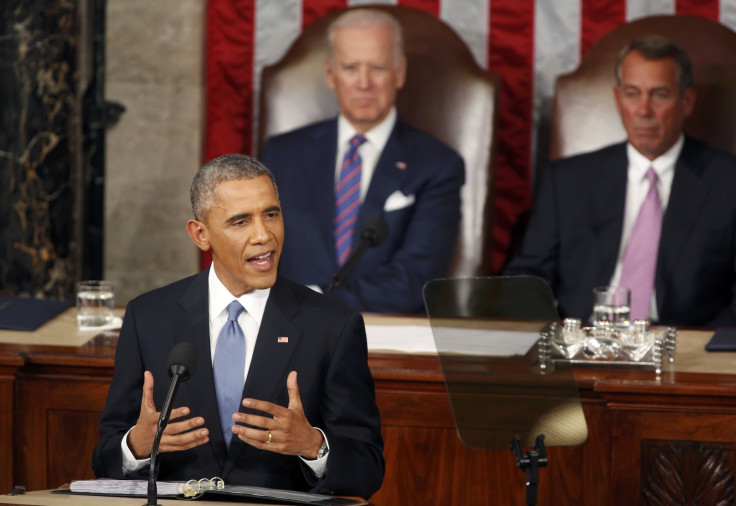President Obama Focuses On Taxes, Middle Class In State Of The Union

WASHINGTON -- President Barack Obama made helping the middle class the central element of his State of the Union address Tuesday, highlighting several proposals to help American workers. The problem for Obama is that most of his proposals -- like cutting taxes for lower income earners by raising taxes on higher payers -- stand little chance of even getting a vote in the Republican-controlled Congress.
But there's a reason he spent the bulk of his speech talking about the kind of proposals that are popular with voters. Lower taxes for workers, credits for child care, free community college and mandatory sick leave for employees are difficult to oppose. They'll be used by the White House for the next two years to criticize Republicans in Congress, and will make good talking points for Democratic candidates in 2016.
Obama delivered a rousing speech -- drawing Democrats to their feet and tossing in an improv shot at Republicans -- that was heavy on uplifting values and sweeping ideological statements. It was, however, light on policy proposals -- the only real sign in the speech that Obama acknowledges his party has lost control of the Senate.
Obama implicitly and explicitly threatened to veto legislation already moving through both chambers. He reinforced his support for several proposals Republicans have already shot down. He mostly stayed away from his most controversial stances, like his immigration executive orders and the Affordable Care Act. But he spoke about only a handful of proposals that might have true bipartisan support, like trade promotion authority and cybersecurity reforms.
Although he reached back rhetorically to the theme of unity he evoked in his 2004 keynote speech -- "We are still more than a collection of red states and blue states" -- the word “bipartisan” appeared only three times in the more than 6,500-word speech.
“We can’t slow down businesses or put our economy at risk with government shutdowns or fiscal showdowns,” Obama said. “We can’t put the security of families at risk by taking away their health insurance, or unraveling the new rules on Wall Street, or refighting past battles on immigration when we’ve got a system to fix. And if a bill comes to my desk that tries to do any of these things, it will earn my veto.”
One of the most telling political moments came when Obama stated, “I have no more campaigns to run.” It drew a smattering of applause from the Republican half of the room. The president then said, off the cuff, “I know, because I won both of them” -- drawing applause then from Democrats.
But just because Obama himself has no campaigns left to run, doesn’t mean he abandoned electoral politics. He teed up issues for Democrats headed into 2016. Hillary Clinton has made clear she plans to make helping the middle class a central element of her campaign. And since Obama’s proposals are unlikely to move through Congress, Democrats will be quick to blame Republicans for the pinch that middle class Americans may still be feeling two years from now.
Clinton took to Twitter to praise the speech and make clear that she intends to carry it forward.
@BarackObama #SOTU pointed way to an economy that works for all. Now we need to step up & deliver for the middle class. #FairShot #FairShare
- Hillary Clinton (@HillaryClinton) January 21, 2015Issues like wage stagnation, which have plagued lower-income workers during the recovery, and wealth distribution (a recent study found by 2016, the richest one percent will own more than half of the world's wealth) resonate with voters who still feel that the econony hasn't improved for them. Obama laid out the Democratic case which will be repeated over the next two years: Corporations are getting the breaks while the middle class is left to suffer. Government action is needed to level the playing field.
Obama described his series of proposals as “middle-class economics” and argued that by helping the bulk of the nation’s workers it would improve national economic security.
“Middle-class economics means helping working families feel more secure in a world of constant change. That means helping folks afford childcare, college, health care, a home, retirement – and my budget will address each of these issues, lowering the taxes of working families and putting thousands of dollars back into their pockets each year,” Obama said.
But little of what he has proposed stands any chance of becoming a reality in the next two years. He talked only briefly about changing the tax code, a proposal his administration had touted in the week leading up to the speech.
“Let’s close the loopholes that lead to inequality by allowing the top one percent to avoid paying taxes on their accumulated wealth,” Obama said. “We can use that money to help more families pay for childcare and send their kids to college. We need a tax code that truly helps working Americans trying to get a leg up in the new economy, and we can achieve that together.”
Rewriting the tax code has been one of a handful of proposals in Washington that appeared capable of getting bipartisan support. But framed the way Obama has -- to raise upper income taxes to offset cuts in lower income taxes -- it is unlikely to get anywhere in Congress. Republicans have been insistent: They will only agree to eliminate corporate loopholes in order to offset lowering their rates.
So now taxes will become a messaging battle -- not a legislative one. Democrats will say they’re trying to help middle income voters. Republicans, labeling the Obama plan "income redistribution," will say they are trying to improve the economy for everyone. And 2016 will determine who the voters believe.
© Copyright IBTimes 2024. All rights reserved.





















